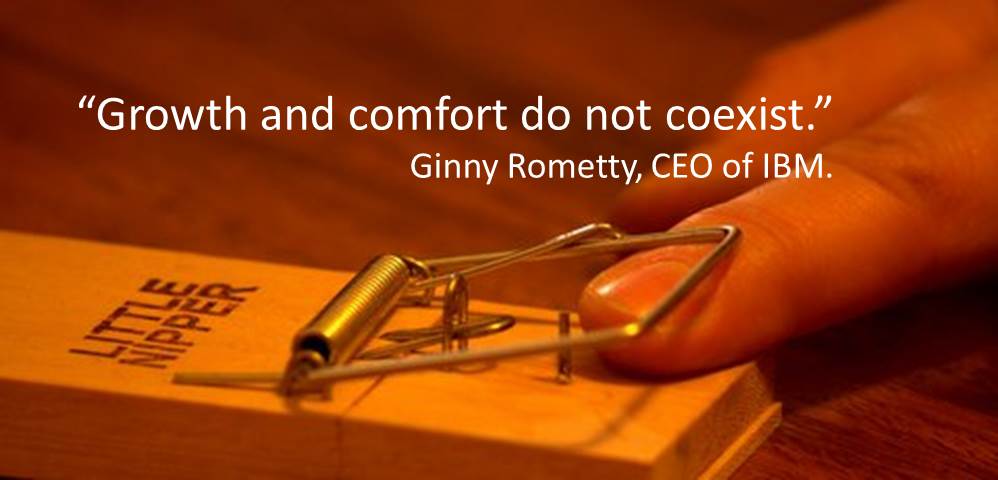Category Archives: Blog
An 82-Year-Old Barber Offers Haircuts for Hugs
At age 57, Anthony Cymerys retired from a career in business and started a mobile barbershop in 1988, offering his services at shelters, convalescent homes and a local YMCA. These days, the Hartford, Connecticut resident — known on the streets as Joe the Barber — continues to help the less fortunate.
Each Wednesday, the 82-year-old Cymerys sets up a chair in Hartford’s Bushnell Park and puts his clippers to work. For longtime clients, the homeless or those facing hard times, the haircut fee is always the same: a hug.
Cymerys decided to offer haircuts for hugs after being inspired by a church sermon. His goal: to help the homeless not look homeless.
You can read more about Joe the Barber’s heart-warming story in this article.
Growth Hurts: Creating Positive Discomfort
Growth hurts.
Doubt and stress describe growth points. “Growth and comfort do not coexist.” Ginny Rometty, CEO of IBM.
Growth feels good after, not during.
Growth occurs when you think or do things you haven’t already thought or done. New feels awkward. The more it hurts – without breaking or defeating – the more you grow.
Why:
If growth hurts, why do it?
Grow yourself because…
You are your contribution.
Growth increases impact and magnifies meaning.
Others:
Growth isn’t only about you.
Leaders grow others.
The real question is how can you create positive, useful discomfort for someone else?
New opportunities represent opportunities to grow.
“It may surprise you that your job as an open-door leader is to make people uncomfortable, but good opportunities create discomfort.” Bill Treasurer, “Leaders Open Doors.”
Bill offers three components of positive, purposeful discomfort:
Deliver discomfort in doses
Start with small bites. Don’t…
View original post 180 more words
Deceiving Without Lying
 “It’s true I deceived you but I wasn’t lying.”
“It’s true I deceived you but I wasn’t lying.”
The statement, spoken brazenly by a work colleague, momentarily floored me. I thought deception and lying were the same thing. A little bit of research suggests there may be a difference.
In ‘Why Leaders Lie: The Truth About Lying in International Politics’, the author claims there are three different kinds of deception: lying, spinning, and concealment.
Lying is when a person makes a statement he knows to be false in order to deceive the target audience. “Lying can involve making up facts that one knows to be false or denying facts that one knows to be true.” In addition, a person is lying when he uses true facts to make the case that something is true which he knows is not true.
On the other hand, spinning is when a person emphasizes certain facts to make a point, while, at the…
View original post 144 more words
Do Farmers Have Choices?
There seems to be a consensus going around that farmers have no choice when it comes to the seed they choose to plant. Or if they do have a choice, large corporations like Monsanto force it upon them. And if anybody tries to voice their opinion and let the farmer’s themselves speak upon their choices, the individual suddenly becomes a pawn for Monsanto.
Okay so the above example may be a little extreme. Doesn’t mean I haven’t seen it happen again and again online. Why is it that because we are behind a computer it gives us the license to be disrespectful? Anyway, back to farmers. I was interested in what the farmers themselves have to say about their seed choices, how they choose the seed they do, and why do they CHOOSE to plant GMOs or maybe they don’t? So I asked several farmers some questions… And here’s what…
View original post 1,698 more words
Help for Blabbermouths

Raise your hand if you have a boss who talks too much. Blabbermouth bosses exasperate everyone.
Raise your hand if you’re a boss. I bet you talk too much, too. As a general rule…
Leaders talk too much and listen too little.
Blabbermouth bosses talk too much because they:
- Don’t want others to talk.
- Believe they are “all that.” You can’t silence self-important prima donnas.
- Feel strongly. Passion drives verbosity.
- Love power and control. Research shows the powerful talk more than others.
- Know too much. Why listen when you already know? The gift of wisdom drops like pearls from their lips.
- Don’t care about others.
- Feel fear. Doctors know talkative patients are nervous, for example.
Bonus: Weak leaders talk too much when trying to convince skeptics.
Tips for Blabbermouths:
Forget:
Forget about active listening. It’s beyond you. Just shut up.
Master silent listening before
attempting active listening.
Space:
Silence…
View original post 114 more words
What exactly is Apple?
Appily Ever After?
I was very interested to read this funny take on psychology smartphone apps in the New York Times (by Judith Newman) – or more accurately, how NOT to build a psychology app. I just blogged about this general topic in my last post, and what struck me most about this article was the notion of time.
Art by Emily Flake (published in the New York Times 4/5/2013)
This article seems to suggest that mental health apps should quickly and effortlessly facilitate our relationships, efficiency, and well-being. As Newman writes in the article: “All of these apps require thought. Lots and lots of thought. Thinking is what I do all day long. I needed something that would turn my mind off, not on.”
Great point. Maybe we don’t want the app to be our shrink – because when we go to a therapist, we tend to have a set…
View original post 321 more words


